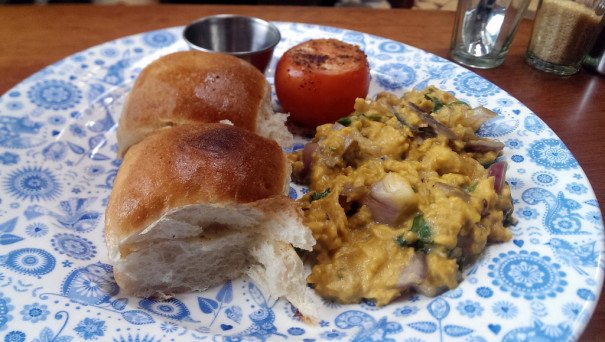
Less Insipid Scrambled Eggs Designed for the Indian Palate

Less Insipid Scrambled Eggs Designed for the Indian Palate
Akuri in Mumbai
I’m at Café Military in the heart of downtown Mumbai on a weekday morning. It is 10 am and only two tables are occupied, each with a gentleman, engrossed in the morning’s newspaper. One of them is sipping on a bottle of London Pilsner beer.
We pick our table at the other end of the café near the cashier, a stern-looking man who is likely to get annoyed if you don’t tender exact change. The waiter doesn’t hand us a menu: the single sheet of paper is right on our table, first laminated in clear plastic, then held in place by a piece of glass that serves as our tabletop. We peek through the glass to see what’s on offer for breakfast. I order akuri, a typical Parsi breakfast dish, and ask if I need to order bread with that. It comes with a “lot of bread,” the waiter assures me.
While my friend and I wait for our food, we both agree that we’ve stepped back in time. This Irani café could be the setting for a 1970s Hindi film, an unemployed young man with little to his name seated at this table, mulling over the woman of his dreams, hatching plans to make money, while ordering one cup of masala chai after another. There’s very little that seems to have changed in the café, and it’s close to what it looked 30, maybe 40, years ago. The old wooden tables are placed close to each other, and the walls are almost devoid of colour. Small paintings of erstwhile Mumbai adorn the walls, alternating with mirrors to create the illusion of space. Old-fashioned tube lights hang from the ceiling while stand and ceiling fans whirl gently. The red-and-white checkered tablecloth has been replaced with green-and-white.
The akuri arrives fairly quickly, filling up a bright yellow plastic quarter-plate. The rather large side of thickly-sliced baguette fills up another. The eggs are rather yellow, obviously laced with turmeric. I spot chopped green chillies, the classic Indian way to heat up a dish.
“Akuri is essentially scrambled eggs,” my Parsi sister-in-law had once told me. “But with some additional ingredients like onions, tomatoes, and spices.” I’ve never been a fan of scrambled eggs, their taste and texture too insipid for my Indian palate. But akuri? Oh, akuri is different.
My akuri is super soft and lightly mashed. It packs in flavor. Chopped onions add bite, tomatoes lend a hint of tartness, and fresh coriander leaves with some Indian spices bring the touch of piquancy that are absent from typical scrambled eggs. At last, scrambled eggs that look good and taste great. The slight toughness of the freshly-baked bread is a perfect complement to the akuri. This is a breakfast dish I could come back to often.
Café Military is one of the several Irani restaurants that dot the old part of Mumbai. Iranian Zoroastrians (or Iranis, for short) first migrated to India in the 19th century from Persia (now Iran), and started restaurants in Bombay (now Mumbai), primarily catering to low-income workers. Today, they keep costs low by focusing on inexpensive food rather than inviting décor or elegant service. While they were mostly popular for snacks like brun maska (buttered buns) and baked goods (puffs and cakes), some of them also serve typical Parsi fare, like dhansak (mutton curry), lagan nu custard (desserts of eggs, milk and custard) and akuri, among others.
As an intrinsic part of the city’s food culture, Irani restaurants have long fed retired folks like the beer-ordering man at Café Military, college students, office clerks, errand boys, and foodies seeking nostalgia. Unfortunately, their unwillingness to adapt to 21st century realities, stiff competition from ubiquitous street vendors, and rising costs are threatening the survival of Irani restaurants. Several have shut shop already. For the few that live on, survival is perhaps a constant battle. But, like the city of Mumbai, a business survives by being aggressive and street-smart. Nostalgia-seeking customers aren’t enough.
But while the remaining Irani restaurants endure, I’d like a plate of akuri for breakfast, please.